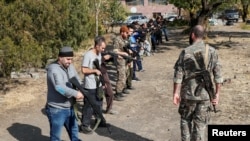Armenia and Azerbaijan have agreed to refrain from targeting residential areas in the conflict over the Nagorno-Karabakh region that has left hundreds of people dead.
The agreement was reached Friday during talks in Geneva between the foreign ministers of the two countries, along with representatives from France, Russia and the United States.
Armenia and Azerbaijan promised to “not deliberately target civilian populations or nonmilitary objects” and to exchange the bodies of fighters as well as exchange lists of prisoners of war.
The deal falls short of a cease-fire after three previous cease-fires failed. The most recent one was brokered in Washington last Sunday by U.S. Secretary of State Mike Pompeo and followed two previous failed cease-fires negotiated by Russia.
Russia, the United States and France co-chair the Minsk Group, set up by the Organization for Security and Cooperation in Europe in 1992 to mediate the conflict.
The ongoing fighting between Azerbaijan and Armenia erupted September 27 and has killed hundreds of people, marking the biggest escalation since a 1994 cease-fire over the breakaway region.
The predominantly ethnic Armenian territory declared its independence from Azerbaijan in 1991 during the collapse of the Soviet Union, sparking a war that claimed the lives of as many as 30,000 people before a 1994 cease-fire.
According to AP, Azerbaijani forces pushed farther into Nagorno-Karabakh on Friday.
Many observers are concerned fighting could expand into a wider conflict involving Turkey, an ally of Azerbaijan, and Russia, which considers the region to be in its sphere of influence.
On Thursday, Russian President Vladimir Putin called for Turkey to be invited to the talks.





